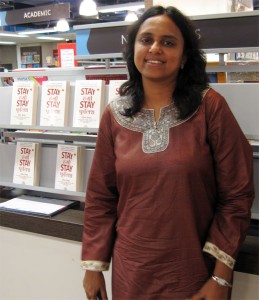Interview by Anupama Krishnakumar
[box]Rashmi Bansal is the author of the bestseller ‘Stay Hungry Stay Foolish’ – the book featuring inspiring stories of 25 IIM Ahmedabad graduates who took to entrepreneurship. Rashmi’s second book, ‘Connect the Dots’ that features inspiring stories of non-MBA entrepreneurs has been published recently. Rashmi writes on youth, entrepreneurship and careers and is also the author of the popular blog Youth Curry (http://youthcurry.blogspot.com). In an interview to Anupama Krishnakumar, Rashmi talks at length about both her books, the Indian market and about JAM (Just Another Magazine – www.jammag.com) – the youth magazine of which she is co-founder and editor. Additionally, don’t miss out on her advice to aspiring entrepreneurs! Excerpts from the interview.[/box]What was similar and what was different about the stories of entrepreneurs in your first book ‘Stay Hungry Stay Foolish’ that featured MBAs and your second book, ‘Connect the Dots’ that featured non-MBAs?
The common point is, whether you are an MBA or a non-MBA, one has to struggle; the first three to five years are going to be difficult for you; nothing comes on a platter; I am talking about the first generation entrepreneurs – they have not come from big business families; they don’t have such easy access to money and maybe they are thinking of doing something new and different – so the product may not win immediate acceptance. So, anyone on the road of entrepreneurship has to struggle initially.
Talking of differences, I think one of them is that the MBAs are more knowledge-industry oriented. They may start something that requires more of brain work. They may get into IT or dotcom, BPO or finance and such areas. However, in the case of non-MBAs, many of them have got into businesses like food and education. Some of their businesses generate immediate cash. Their business model is also a bit different.
Another difference is that MBAs do find it a little easier to raise capital once they have reached a certain level. If they are able to prove that their idea has potential it may be easier. But it is not necessary that every MBA gets funded that way. In fact, even the non-MBAs who have scaled it up a lot have got the correct advice at the right time from people.
The common thread is that if you really believe in yourself and what your dream of, you can make it come true, even if you are starting from zero; you don’t have any money, you don’t have a god father. You still can do it. In India today, we can. I am not saying difficulties don’t exist. But they are not such difficulties that you cannot come out. If you need to do it, you do it.
If you are really going to build a very big company, then maybe an MBA will help you at some point. You will be able to raise capital more easily but even as an non-MBA there are examples of people who have done it. So, there’s no formula actually. Each person is different and we have our own dreams which drive us to make us want to do something, to motivate us. So, each one has to decide what their goal is and once that’s decided, each goal is achievable. Different people have done it. Wherever you feel you can identify with a person, then you can learn from what he or she has done. But, remember, there is no formula for success and success is something that you have to define for yourself.
How attractive is the Indian market today?
In India today, there is a huge market for any kind of product or service. There is one example in the book, ‘Connect the Dots’. Mr.Satyajit Singh got interested in ‘Makhana’ (food stuff that looks like thermocol balls) and he has really changed the way in which the product is being produced, packaged and sold. So, it is actually such a specific thing that he has decided to focus on. Hence, today I think in any field, it doesn’t have to be a totally new idea. You can take some old idea and you can do it in a different way and you can be a success. In the book, ‘Stay Hungry Stay Foolish’, there is the story of Mr. Narendra Murkumbi, who has set up a very large sugar mill. Sugar is an old product but he did something that’s different from other sugar producers. He made farmers his shareholders. He generated his own power through the waste material of sugar.
The good thing is that more and more people are thinking that they are doing business not just to become rich but also see how other people can benefit. It is how innovative your ideas are and how within your circle of influence you can make some people’s life better. I think people are concerned about that.
Were you planning on your book for a long time or is it something that happened just like that?
No, it just happened. The first book was a project given to me by IIM Ahmedabad and then once that happened, I felt that I can write one more book. But I have been writing since I was 17. Then, I used to write for different newspapers and magazines. Like Mr. Narayan Murthy said, ‘it took me 25 years to become an overnight success’. So, I think even as a writer, I have been writing for over 20 years, it’s just that I hadn’t written a book.
When you started JAM what was in your mind?
I wanted to have a magazine which is of, for and by young people because there were no magazines like that. Everything was kind of written by old people for the youth. So our concept was – we will have reporters and writers from different colleges – a platform where people can contribute and be creative and can really interest themselves. When I was in college, I used to write and it was really difficult because people would just mostly reject your work without even giving any feedback as to what was wrong with it. I wanted to have a platform where we could be different, one where we could encourage young writers. So that was the thinking behind it and I think that’s why it becomes like an institution. Today, I am not involved with it full time. I am just on a mentor role. But there is a young team in place and the whole philosophy continues. So, we have students and young people who contribute.
What would your advice for aspiring entrepreneurs be?
 Well, my advice is to believe in yourself. Start small and think big! Big does not necessarily mean in size but in whatever you want to do. Never think, ‘Ok, I can’t do it’ because, anything that you really set your mind on you can do it. It’s all about your attitude. Once you have the attitude you will find everything else falls in place – the money, the people, everything will fall in place. Even though you will have to struggle initially, the satisfaction that you will get at the end of your entire effort will be really worth it. Before every success there may be a failure. But, you have to have faith in what you are doing and keep doing it. Do not give up easily on your dreams!
Well, my advice is to believe in yourself. Start small and think big! Big does not necessarily mean in size but in whatever you want to do. Never think, ‘Ok, I can’t do it’ because, anything that you really set your mind on you can do it. It’s all about your attitude. Once you have the attitude you will find everything else falls in place – the money, the people, everything will fall in place. Even though you will have to struggle initially, the satisfaction that you will get at the end of your entire effort will be really worth it. Before every success there may be a failure. But, you have to have faith in what you are doing and keep doing it. Do not give up easily on your dreams!
Pic :
Matteo De Felice – http://www.flickr.com/photos/kwisatz/
[facebook]share[/facebook] [retweet]tweet[/retweet]





